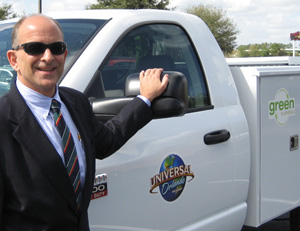 Honeywell won the bid to outfit the Poway Unified School District in San Diego, CA with more solar power capabilities. The new solar hardware is expected to reduce the school district’s utility costs and offer a district-wide education tool to students.
Honeywell won the bid to outfit the Poway Unified School District in San Diego, CA with more solar power capabilities. The new solar hardware is expected to reduce the school district’s utility costs and offer a district-wide education tool to students.
Honeywell has announced that Poway Unified School District in San Diego, Calif. has awarded the company a solar project that is expected to save the district more than $1 million in energy costs over the next 20 years. Under the agreement, Honeywell will install solar arrays at four of the district’s schools and sell the electricity the panels produce to the district.
Honeywell will install the solar arrays on the roofs at Poway High School, Westview High School, Oak Valley Middle School and Chaparral Elementary School. The arrays are expected to generate a collective 578 kilowatts of power and more than 1 million kilowatt-hours of electricity annually — enough energy to power 90 homes per year. They also will cut energy costs during peak consumption when utilities typically charge a premium.
In addition to reducing costs, the solar arrays are expected to provide an educational tool that faculty can use to teach students about energy conservation and alternative energy sources. Through a Web-based portal, teachers and students will be able to see the real-time electrical output from the solar technology and learn how the systems operate.
The new arrays will deliver substantial environmental benefits as well, cutting carbon dioxide emissions by approximately 1.1 million pounds per year. According to figures from the U.S. Environmental Protection Agency, this is equivalent to removing more than 100 cars from the road or planting 400 acres of trees.
Honeywell expects that the school will start benefiting from the solar arrays by October of this year.




 One hundred years after the original 1908 event designed to show the world how dependable automobiles could be, the 2008 Great Race will feature vehicles running on alternative fuels, such as biodiesel, ethanol, and even solar power.
One hundred years after the original 1908 event designed to show the world how dependable automobiles could be, the 2008 Great Race will feature vehicles running on alternative fuels, such as biodiesel, ethanol, and even solar power. This time around, the field will consist of a motley mix of vintage and new cars, including a 1904 Thomas Flyer and a 1941 Willys Jeep. They will rub fenders, metaphorically speaking, with various vehicles running alternative fuels — in an attempt to prove these new technologies by forging them in the crucible of a high-endurance test. Think Range Rovers on biodiesel, a multi-fuel-capable Aston Martin DB6 and a 2007 Buell Ulysses motorbike on E85 ethanol.
This time around, the field will consist of a motley mix of vintage and new cars, including a 1904 Thomas Flyer and a 1941 Willys Jeep. They will rub fenders, metaphorically speaking, with various vehicles running alternative fuels — in an attempt to prove these new technologies by forging them in the crucible of a high-endurance test. Think Range Rovers on biodiesel, a multi-fuel-capable Aston Martin DB6 and a 2007 Buell Ulysses motorbike on E85 ethanol. This is one of the most unique things I’ve seen in just more than a year of blogging for Domestic Fuel: a sports utility vehicle (SUV) that has its own biodiesel refinery in the back!
This is one of the most unique things I’ve seen in just more than a year of blogging for Domestic Fuel: a sports utility vehicle (SUV) that has its own biodiesel refinery in the back! Officials at Penn State University say there has been no negative effects on tractors that they moved up to running on 100 percent biodiesel. The school started running its tractors on B20 in 2002 and more recently began testing three New Holland tractors (out of the 100 the school uses) on the B100.
Officials at Penn State University say there has been no negative effects on tractors that they moved up to running on 100 percent biodiesel. The school started running its tractors on B20 in 2002 and more recently began testing three New Holland tractors (out of the 100 the school uses) on the B100. A bill introduced in the Arizona legislature would help pay the costs of gas stations adding biofuels to their lineups.
A bill introduced in the Arizona legislature would help pay the costs of gas stations adding biofuels to their lineups. Buses in the Monterey-Salinas, California area could soon be running on biodiesel made from mustard seeds. And what makes this idea even more intriguing is that the transit authority itself will be growing the alternative to the more conventional feedstocks, such as soybeans.
Buses in the Monterey-Salinas, California area could soon be running on biodiesel made from mustard seeds. And what makes this idea even more intriguing is that the transit authority itself will be growing the alternative to the more conventional feedstocks, such as soybeans.